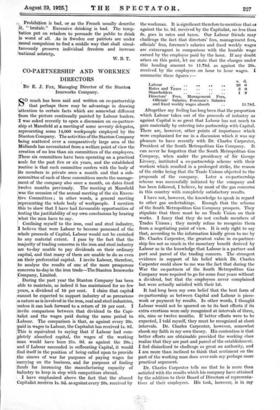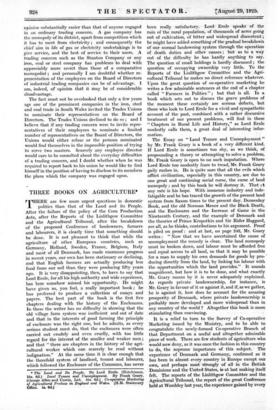1 that perhaps there may be advantage in drawing 'attention
to certain facts which are somewhat different from the picture continually painted by Labour leaders. II was asked recently to open a discussion on co-partner- ship at Mansfield at a meeting of some seventy delegates, representing some 14,000 workpeople employed by the Stanton Company. The activities of the Stanton Company being scattered over a comparatively large area of the Midlands has necessitated from a welfare point of view the 'creation of no less than six committees of the employees. These six committees have been operating on a practical scale for the past five or six years, and the established ioutine is that each committee confers with the body of tits members in private once a month and that a sub- !committee of each of these committees meets the manage- ( ent of the company also once a month, on dates fixed welve months previously. The meeting at Mansfield as the occasion of the annual meeting of the six Execu- tive Committees ; in other words, a general meeting „representing the whole body of workpeople. I mention this to show that I have had favourable opportunities of itesting the justifiability of my own conclusions by hearing what the men have to say.
Confining myself to the iron, coal and steel industry, iI believe that were Labour to become possessed of the iahole proceeds of Capital, Labour would not be enriched any material extent. I pass by the fact that the jority of trading concerns in the iron and steel industry are to-day unable to pay dividends on their ordinary capital, and that many of them are unable to do so even flan their preferential capital. I invite Labour, therefore, I `to analyse the results of one of the more prosperous ?concerns to-day in the iron trade—The Stanton Ironworks Company, Limited.
During the past year the Stanton Company has been able to maintain, as indeed it has maintained for no few !years, a dividend of 10 per cent. I claim that capital teannot be expected to support industry of so precarious a nature as is involved in the iron, coal and steel industries, unless it can look forward to a return of 10 per cent. I !invite comparison between that dividend to the Capi- Italist and the wages paid during the same period to !Labour. The comparison is that, as against every 20s. !paid in wages to Labour, the Capitalist has received ls. 9d. This is equivalent to saying that if Labour had com- jpletely absorbed capital, the wages of the working tman would have been 21s. 9d. as against the 20s.; and if Labour succeeded in suffocating Capital, it would ;find itself in the position of being called upon to provide !the sinews of war for purposes of paying wages for !carrying on the business, and for purposes of finding !funds for increasing the manufacturing capacity of industry to keep in step with competitors abroad.
I have emphasized above the fact that the abused Capitalist receives ls. 9d. as against every 20s. received by the workman. It is significant therefore to mention that as against the ls. 9d. received by the Capitalist, no less than 8s. goes in rates and taxes. Our Labour friends may challenge the fact that directors' fees, management fees, officials' fees, foremen's salaries and fixed weekly wages are extravagant in comparison with the humble wage earned by the employee paid by the hour. If any doubt arises on this point, let me state that the charges under this heading amount to 11.1'8d. as against the 20s. received by the employees on hour to hour wages. I summarize these figures :—
s. d.
Labour .. .. •• • • • • 20 0 Rates and Taxes .. .. .. .. 3 0 Shareholders .. .... .. 1 9 Directors' Fees, Management Fees, Officials' Salaries, Foremen's Salaries and fixed weekly wages absorb .. 11.78d.
Altogether my feeling has long been that the proportion which Labour takes out of the proceeds of industry as against Capital is so great that Labour has not much to gain materially by entering into partnership with Capital. There are, however, other points of importance which were emphasized for me in a discussion which it was my pleasure to have recently with Dr. Charles Carpenter, President of the South Metropolitan Gas Company. It can never be forgotten that the South Metropolitan Gas Company, when under the presidency of Sir George Livesey, instituted a co-partnership scheme with their workers which resulted in a prolonged strike, the reason of the strike being that the Trade Unions objected to the proposals of the company. Later a co-partnership scheme was successfully initiated by the company and has been followed, I believe, by most of the gas concerns in this country with completely satisfactory results.
I have not, however, the knowledge to speak in regard to other gas undertakings. Enough that the scheme of the South Metropolitan Gas Company prospers. They stipulate that there must be no Trade Union on their works. I fancy that they do not exclude members of Trades Unions ; they merely refuse to recognize them from a negotiating point of view. It is only right to say that, according to the information kindly given to me by Dr. Charles Carpenter, the greatest value in co-partner- ship lies not so much in the monetary benefit derived by Labour as in the knowledge that Labour is a partner and part and parcel of the trading concern. The strongest evidence in support of his belief which Dr. Charles Carpenter could show to me was the fact that during the War the co-partners of the South Metropolitan Gas Company were required to go for some four years without a dividend, but that the employees never complained but were actually satisfied with their lot.
It had long been my own belief that the best form of co-partnership as between Capital and Labour is piece- work or payment by results. In other words, I thought Labour would not be spurred on to its best efforts if its extra exertions were only recognized at intervals of three, six, nine or twelve months. If better efforts were to be expected, I told myself, they must be recognized at short intervals. Dr. Charles Carpenter, however, somewhat shook my faith in my own theory. His contention is that better efforts are obtainable provided the working class realize that they are part and parcel of the establishment. I feel disinclined to challenge so great an authority, and I am more than inclined to think that sentiment on the part of the working man does over-rule my perhaps more practical argument.
Dr. Charles Carpenter tells me that he is more than . satisfied with the results which his company have attained by the addition to their Board of Directors of representa- tives of their employees. His task, however, is in my opinion substantially easier than that of anyone engaged in an ordinary trading concern. A gas company has the monopoly of its district, apart from competition which it has to meet from electricity ; and consequently the chief aim in life of gas or electricity undertakings is to give service, and the best of service to their users. A trading concern such as the Stanton Company or any iron, coal or steel company has problems to deal with appreciably more secret than those of a comparative monopolist ; and personally I am doubtful whether re- presentation of the employees on the Board of Directors of industrial trading companies can be of advantage. I am, indeed, of •opinitat that it may be of considerable disadvantage.
The fact must not be overlooked that only a few years age one of the prominent companies in the iron, steel and coal trade in South Wales invited the Trades Unions to nominate their representatives on the Board of Directors. The Trades Unions declined to do so ; and I believe that if any trading concern were to invite repre- sentatives of their employees to nominate a limited number of representatives on the Board of Directors, the Unions would either refuse or the persons nominated would find themselves in the impossible position of trying to serve two masters. Scarcely any employee director would care to be consulted about the everyday difficulties of a trading concern, and I doubt whether when he was required to report back to his union he would like to find himself in the position of having to disclose to its members the plans which the company was engaged upon.



































 Previous page
Previous page